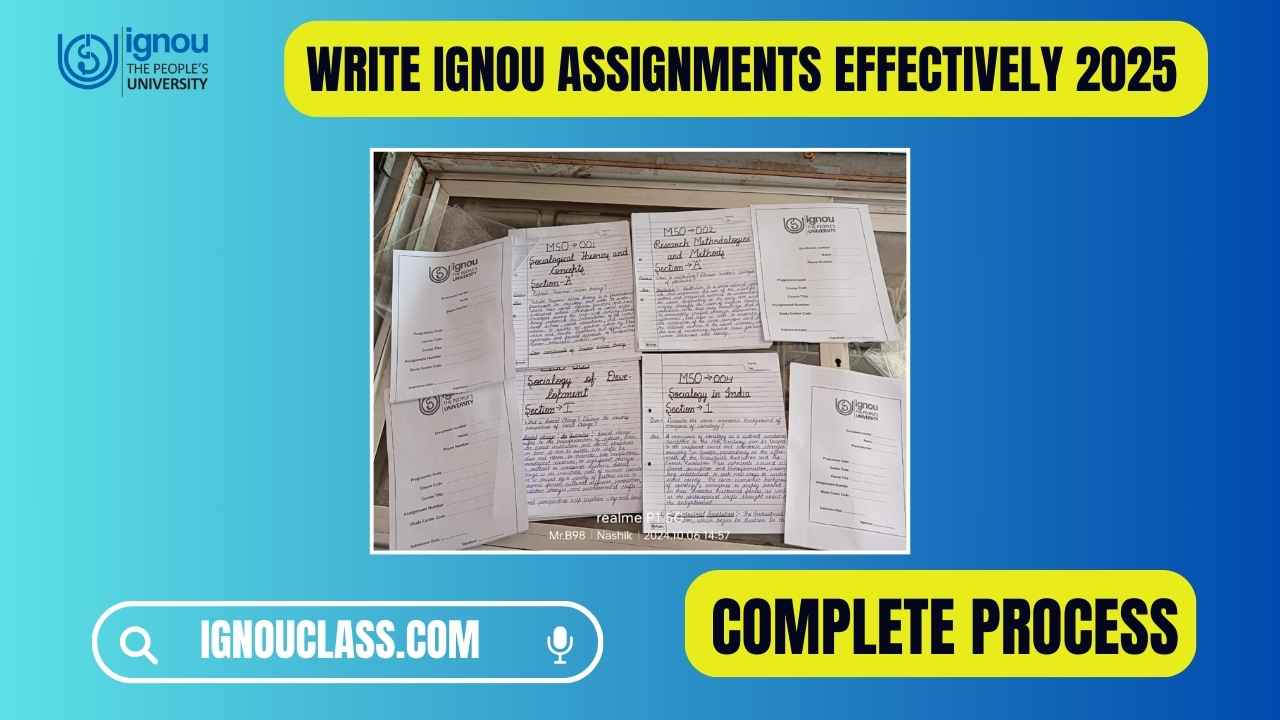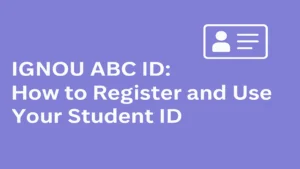Introduction: The Importance of Completing IGNOU Assignments on Time
If you’re an IGNOU student, you already know that assignments are a critical part of the curriculum. Whether you’re pursuing a distance education degree or a certificate program, assignments contribute significantly to your final grades. But, with assignments being spread across multiple subjects and deadlines sometimes overlapping, completing them on time can feel overwhelming.
But don’t worry! In this guide, we’ll walk you through the strategies, tips, and tools to help you complete your IGNOU assignments effectively and on time—without the stress! 💡
Why Timely Submission Matters for Your Academic Success
Timely assignment submissions are not only a matter of grades—they also show your commitment and discipline. IGNOU evaluates your progress based on assignment completion, and late submissions can cost you precious marks. Moreover, completing your assignments on time will give you the confidence to focus on upcoming exams, projects, and your overall learning journey.
A Brief Overview of the Ignou Assignment Submission Process at IGNOU
Assignments for IGNOU are generally given every semester and are submitted offline or online depending on the course. You’ll need to download the assignment question papers, complete the tasks, and submit them by the deadline to your respective study center or through the online portal. Now that we understand the importance of assignments, let’s explore how to complete them effectively.
Breaking Down IGNOU Assignments: What You Need to Know 📚
Before diving into the process of completing your assignments, it’s crucial to understand their structure and what is expected from you.
Structure and Format of IGNOU Assignments
Typically, an IGNOU assignment is divided into multiple questions. These might include theory-based questions, case studies, or problem-solving exercises. Most assignments will have a mix of both short-answer and long-answer questions. It’s important to follow the specific format given in the guidelines. Most assignments ask for:
- Clear headings for each question
- Sub-headings for different sections
- A brief introduction for each topic
Understanding the Marks Distribution and Evaluation Criteria
Each assignment has a specific weightage depending on the subject. Understanding the marks distribution will help you allocate time efficiently. For instance, a question worth 5 marks requires a more concise answer than one worth 15 marks.
Always refer to the evaluation criteria—usually mentioned on the assignment paper. This will give you insight into how much emphasis is placed on clarity, depth of knowledge, referencing, and logical flow.
Common Mistakes to Avoid When Writing IGNOU Assignments
- Lack of clarity: Your answers should be to the point, with clear explanations.
- Plagiarism: Always cite your sources properly.
- Ignoring word limits: Adhere to the given word count to avoid deductions.
Creating a Study Plan: Time Management for IGNOU Assignments ⏰
A well-organized study plan can make all the difference when you have multiple assignments to complete within a short time frame.
How to Schedule Your Time for Ignou Assignment Completion
Start by identifying all of your assignment deadlines and create a timeline that allows you to work on each assignment in phases:
- Week 1-2: Research and gather materials
- Week 3: Write the first draft of all assignments
- Week 4: Proofreading and final submission
Remember, breaking your work into manageable chunks helps prevent last-minute panic. Consistency is key—dedicate a fixed time each day for your assignments to stay on track.
Balancing Assignment Work with Other Commitments (Job, Family, etc.)
If you’re a working professional or have other commitments, it’s essential to balance them with your assignments. Set priorities for each day and make the most of your free time. For example:
- During weekends, work on more extensive parts of your assignment.
- Use commuting time to read or gather resources.
The Role of Consistency in Completing Assignments Efficiently
Consistency breeds productivity. Make it a habit to spend a fixed amount of time daily working on assignments. This will help you stay motivated and disciplined, even when other responsibilities compete for your time.
Understanding the Ignou Assignment Guidelines
Every IGNOU assignment has specific guidelines that you must follow. These include things like word limits, references, and formatting instructions. Understanding and following these rules is crucial for scoring well.
How to Interpret the Instructions Given by IGNOU
Carefully read the assignment instructions to understand:
- The number of questions you need to answer
- Whether you need to answer all questions or just select a few
- Formatting rules like font size, spacing, and margins
If you’re unsure about something, don’t hesitate to contact your tutor or refer to the study guide for clarification.
Following the Word Limit and Formatting Requirements
IGNOU typically specifies a word limit for each question. Stick to the given word count, as exceeding it can lead to penalties, and writing too little may leave out essential points.
When formatting your assignment, ensure that you:
- Use the correct font size (usually 12)
- Maintain 1.5 line spacing
- Include page numbers (if required)
Understanding the Referencing and Citation Rules for IGNOU Assignments
Many IGNOU assignments require you to use referencing styles such as APA, MLA, or Chicago. Always cite your sources correctly to avoid plagiarism. Use in-text citations and provide a reference list at the end of your assignment.
Gathering Resources: Finding Reliable Study Materials 📖
A strong assignment relies on solid research. Here’s how you can gather the right resources:
Accessing IGNOU’s Online Study Material
IGNOU provides online study material through its e-Gyankosh platform. You can access course books, previous assignments, and additional resources to aid your research. Always refer to these materials to align your assignments with the official curriculum.
Using IGNOU’s Official Website and Library for Research
Besides online materials, IGNOU’s official website and library are invaluable sources of information. You can also access previous question papers and model answers to help guide your writing.
Where to Find Books and Journals Relevant to Your Course
When looking for books and journals, try:
- Google Scholar for academic articles
- Library databases for e-books and journals
- Online marketplaces like Amazon for textbooks
Be sure to use credible sources and avoid information that lacks academic validity.
Effective Research for IGNOU Assignments
Research is the backbone of any solid assignment. Without it, your answers might lack depth and credibility.
How to Research for IGNOU Assignments: Tools and Strategies
Use both online and offline resources to gather information:
- Google Scholar, JSTOR, and ResearchGate for peer-reviewed journals
- Books, especially those recommended in your IGNOU study material
- Academic websites and articles related to your subject
Using Google Scholar and Other Online Academic Databases
Google Scholar is an excellent tool for finding research papers and articles. Simply search for keywords relevant to your assignment, and you’ll find a wealth of academic literature to back up your claims.
Citing Your Sources Correctly to Avoid Plagiarism
Proper citation is crucial. Ensure that you:
- Use correct citation styles (e.g., APA, MLA)
- Include both in-text citations and a reference list
Avoid direct copying from sources without acknowledgment. It’s important to paraphrase and summarize properly, while still giving credit to the original authors.
How to Write a Compelling Introduction for Your IGNOU Assignment
The introduction sets the tone for the entire assignment, so it’s essential to get it right.
Importance of a Strong Opening Statement
A good introduction grabs the reader’s attention. It should clearly state:
- The purpose of your assignment
- Background information related to the topic
- An outline of the structure of your assignment
Setting the Context: What to Include in the Introduction
Your introduction should:
- Define key terms or concepts
- Briefly introduce the main points or arguments
- Outline your approach to answering the questions
How to Introduce Your Assignment Topic Effectively
Use a hook to capture the reader’s interest—this could be a thought-provoking question, a statistic, or a quote relevant to the topic.
Structuring Your IGNOU Assignment: Key Sections to Include 📑
A well-structured assignment makes it easier for the reader (and evaluator) to follow your arguments and understand your conclusions. Here’s how to organize your work:
How to Organize Your Assignment into Sections (Introduction, Body, Conclusion)
- Introduction: This section briefly introduces the topic, outlines the scope of your assignment, and states the objectives. Make sure it’s concise but informative.
- Body: The bulk of your assignment should be placed here. The body should have clear sub-sections addressing each part of the assignment question. Ensure each sub-section logically flows into the next, with appropriate examples, case studies, or data points.
- Conclusion: Summarize your key findings or arguments and restate the importance of your work. The conclusion should not introduce new information but rather wrap up the discussion in a clear and succinct manner.
Crafting an Effective Body: Arguments, Evidence, and Analysis
The body of your assignment is where the bulk of your research and analysis is presented. Make sure each paragraph in the body:
- Starts with a topic sentence that introduces the point you’re discussing.
- Uses evidence to support the argument (quotations, statistics, case studies, etc.).
- Explains how the evidence relates to the main question or topic.
Writing a Strong Conclusion: Summarizing Your Key Points
Your conclusion should briefly summarize the main points without introducing any new arguments. It should also:
- Restate the thesis or main argument.
- Draw final conclusions from the evidence discussed.
- Possibly suggest further areas for research or the importance of the topic in the real world.
Writing Style and Language: Tips for Clarity and Coherence ✍️
The language you use in your assignment plays a critical role in its readability and effectiveness.
Using Simple and Precise Language for Better Communication
- Avoid overly complicated sentences. Use simple and direct language to get your point across.
- Be precise: Avoid vague language and stay focused on the subject.
- Break down complex concepts into understandable explanations, especially if your assignment involves difficult topics like theories, models, or case studies.
Avoiding Complex Jargon and Unnecessary Wordiness
- Use technical terms when necessary, but ensure they are defined or explained in context.
- Be concise. Avoid over-explaining. Stick to the point, and cut out unnecessary words or phrases that don’t add value.
Writing for Academic Audiences: Tone, Language, and Presentation
- Maintain an academic tone throughout your assignment. While it’s okay to sound conversational at times, avoid colloquial language or slang.
- Always write in third person (unless the assignment specifically asks for a first-person narrative).
- Keep your language formal and neutral, ensuring that you present arguments objectively, without bias.
Referencing and Citation: Avoiding Plagiarism in Your IGNOU Assignment 📚
Proper referencing and citation are essential parts of any academic writing. Ignoring these can lead to plagiarism accusations, even if unintentionally. Here’s what you need to know:
The Importance of Proper Citation in Academic Writing
- Citing sources acknowledges the work of other scholars and experts in the field.
- Proper citations show that your research is well-grounded in established knowledge.
- It helps avoid plagiarism, which can lead to severe consequences like disqualification or loss of marks.
Common Referencing Styles Used by IGNOU (APA, MLA, Chicago, etc.)
IGNOU typically follows APA and MLA citation styles for assignments. Here’s a quick overview:
- APA Style: Commonly used for social sciences. It involves in-text citations (author, year) and a reference list.
- MLA Style: Often used in humanities. It features in-text citations (author’s name and page number) and a works cited list.
- Chicago Style: Used in history and some other fields, this style includes footnotes or endnotes for citations.
Tools and Apps to Help You with Citation and Referencing
- Zotero and EndNote are great tools for managing citations.
- Mendeley helps with managing references and organizing your research library.
- Citation Machine and EasyBib are also easy-to-use tools for generating references in various citation styles.
How to Edit and Proofread Your IGNOU Assignment 📝
The final stage of your assignment writing process is editing and proofreading. It’s essential to polish your work to ensure it is error-free and meets the required academic standards.
The Role of Editing in Polishing Your Assignment
Editing is the process of checking your work for clarity, organization, and logical flow. When editing, ask yourself:
- Is the argument presented clearly?
- Is there a logical progression from one point to the next?
- Have you addressed all parts of the question?
Common Errors to Look Out for: Grammar, Spelling, and Punctuation
Here are some common mistakes to check for:
- Grammar: Check for subject-verb agreement, tenses, and sentence structure.
- Spelling: Misspelled words can undermine the quality of your assignment.
- Punctuation: Ensure proper use of commas, periods, quotation marks, etc.
Using Tools like Grammarly for Error-Free Writing
Consider using Grammarly to help spot grammatical errors, spelling mistakes, and awkward phrasing. It’s a great tool for non-native English speakers and anyone looking to ensure their writing is polished.
How to Stay Motivated and Avoid Procrastination
One of the biggest hurdles in completing assignments is procrastination. It’s easy to push assignments aside, especially when there are no set classroom deadlines. Here’s how to stay on track:
Overcoming the Challenges of Distance Learning
In distance learning, motivation is often the hardest thing to maintain. The flexibility of studying at your own pace can sometimes lead to distractions and delays.
Setting Small, Achievable Goals to Keep Yourself on Track
Break your assignments into small, manageable goals:
- Set daily or weekly targets (e.g., complete 2 questions per day).
- Celebrate small victories after completing each milestone. Reward yourself with breaks, snacks, or something you enjoy.
The Power of Rewarding Yourself for Meeting Deadlines
If you meet your assignment deadlines or stick to your study plan, reward yourself! This can be as simple as watching an episode of your favorite show, going out for a walk, or enjoying a meal. Rewards will motivate you to continue working hard.
Using IGNOU’s Support Systems: How to Get Help When You Need It 🧑🏫
When you’re stuck on a question or need guidance, don’t hesitate to use IGNOU’s support systems.
How to Reach Out to IGNOU Tutors and Mentors for Clarification
You can contact your assigned tutor for academic support. Many tutors offer email support or virtual office hours to answer your questions.
Utilizing IGNOU’s Discussion Forums and Online Study Groups
- Online forums and study groups are fantastic for getting support from fellow students.
- These platforms allow you to discuss topics, share insights, and ask questions.
Joining Social Media Groups for Peer Support and Motivation
There are many unofficial groups on platforms like Facebook, WhatsApp, and Telegram where students collaborate, share resources, and motivate each other. It’s a great way to feel connected in an otherwise isolated learning environment.
Submitting Your Assignment: Final Steps 🖥️
Once your assignment is ready, it’s time to submit it!
How to Submit Your IGNOU Assignment Online (If Applicable)
If your course allows online submission, follow the instructions provided on the IGNOU portal to upload your assignment. Ensure that you’ve scanned and uploaded all necessary documents.
Submitting in Person: Finding the Right Drop-off Locations
If you’re submitting offline, ensure you drop off your assignment at the right study center or regional center before the deadline. Always keep a copy of your submission receipt as proof.
Double-Checking Before Submission: What to Review and Confirm
Before submitting, make sure you:
- Review the instructions again.
- Verify your citations and references.
- Ensure the assignment is complete and nothing is left out.
Conclusion: How Completing IGNOU Assignments Effectively Impacts Your Success 🌟
Successfully completing your IGNOU assignments isn’t just about getting marks—it’s about building good habits, enhancing your knowledge, and preparing for exams. By following the strategies in this guide, you’ll develop the skills and discipline necessary to excel not only in assignments but in your entire academic journey.
Remember, assignment success can greatly contribute to your overall grades, making it essential to focus on timely completion, quality writing, and consistent effort. You’ve got this!
FAQs
How can I get IGNOU assignment questions?
You can access the IGNOU assignment questions by visiting the official IGNOU website. Each course has a dedicated section where you can download the assignment question papers. Additionally, your study center will provide hard copies, and many IGNOU forums and online groups also share assignment materials.
What is the word limit for IGNOU assignments?
The word limit for IGNOU assignments varies based on the course and the question. Generally, each question in the assignment will have specific word count instructions. For example, a 5-mark question may require a 200-300 words response, while a 15-mark question may need around 800-1000 words. Always check the assignment booklet for exact details.
Can I submit my IGNOU assignment online?
Yes, IGNOU allows online submission for certain courses. You can upload your completed assignment through the IGNOU Online Submission Portal. However, if your course doesn’t support online submission, you will need to submit the assignment physically to your study center. Be sure to check the instructions provided for your specific course.
How do I cite sources in my IGNOU assignment?
Citing sources in your IGNOU assignments depends on the referencing style required. The most common citation styles used are APA, MLA, or Chicago. Always refer to the assignment guidelines to determine the required format. If you’re unsure, consider using citation tools like Zotero, EndNote, or Mendeley for proper referencing.
What should I do if I miss the assignment submission deadline?
If you miss the assignment submission deadline, contact your study center immediately to inquire about any possible late submission policies. Generally, late submissions are not accepted without valid reasons. However, some study centers may grant extensions or allow you to submit the assignment with a penalty. Always plan ahead to avoid missing deadlines!
Related Posts:
- New Job Placement for IGNOU Students in SBI 2025: Best Opportunity
- Top 5 Best IGNOU Courses for 2025: Unlocking Career Opportunities
- IGNOU Guess Paper: Your Comprehensive Guide to Exam Success 2025
- IGNOU Admission for Nursing 2025: Comprehensive Process, Eligibility, Courses, and More!
- IGNOU Online Admission 2025: A Comprehensive Guide for Aspiring Students




